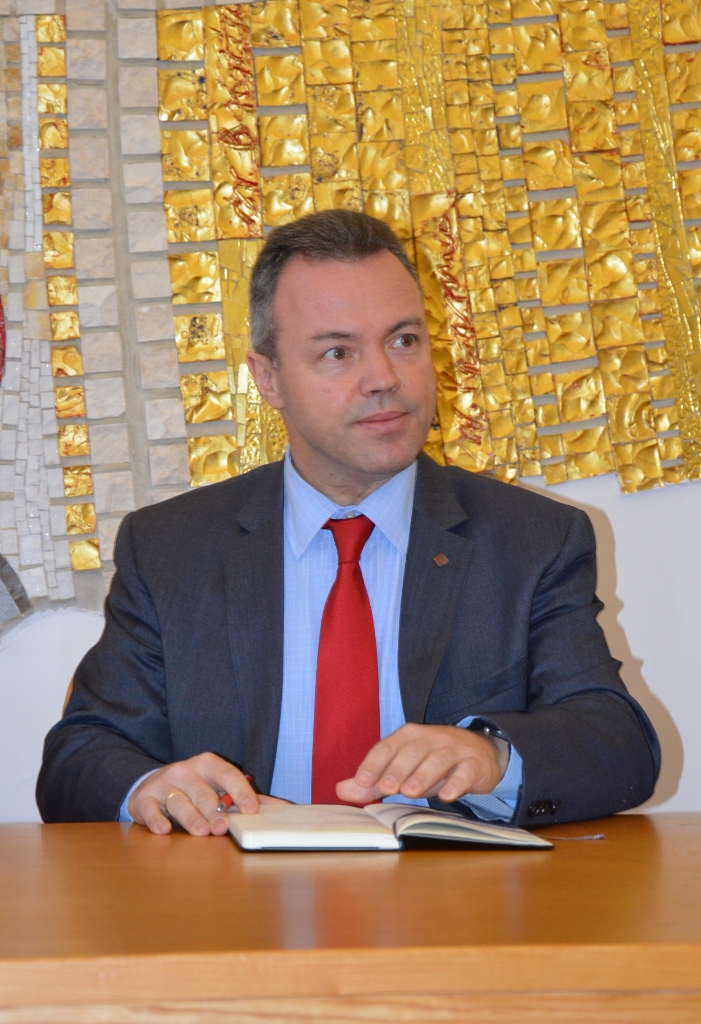Secretary General of Caritas Europa Mr. Jorge Nuño Mayer visited Serbia on 26th and 27th of November. During this visit we had a chance to make an interview with him, in which he gave precious answers to our questions.
- You were in Strasbourg on 25th of November, when the Holy Father spoke to the European Parliament. Do you have a message for us from this event?
The Pope gave a clear message to the members of the European Parliament to foster the dialogue with the Balkan countries, countries seeking for peace and development. That’s a very strong message, considering the fact that the pope said it for the short time he had. I would also like to add that the Pope reminded the politicians to serve the people first, respecting their human rights and to serve the common good. This interest should be above the economic interest.
- You visited Serbia for the first time, what kind of expectation did you have before coming here?
More than expectation I came with a desire to listen, to find out more about Caritas Serbia. Of course I know Caritas Serbia, because I met before with Archbishop Hocevar, the Director of Caritas Serbia Rev. Varga, the coordinator Darko Tot. I know that, on one hand Caritas Serbia is a very professional organization, who works in a very precise and good way, but here I discovered that Caritas Serbia wants to deepen it’s roots in the Social teaching of the Catholic Church.
- What kind of impression did you have about the work of Caritas in our country?
On one side Caritas already has a long experience in the past and it can show results on different fields in the past decades, in terms of peace building, serving people with mental health problems, serving the elderly in their homes, results in the relation with the Government and other organisations. The Church in Serbia can be proud of it’s Caritas. On the other side there is a challenge that the catholics in Serbia see Caritas more and more as their own Caritas, to participate in the work of Caritas as volunteers, through donations or just to speak to their neighbors about this service that Caritas gives to the people in need.
- What do you see as the biggest challenges for Caritas Serbia and for the Catholic Church in our country?
The Catholic Church is always a service to the society. The Church is not made for itself, but it’s here to serve the society in which it’s in. Catholic Church is here to serve all the people of Serbia. Caritas is one of the ways of serving, in the hands of the bishops and the faithful, in order to show that the catholics in this country serve the children of God, the people of this country. I see that as a great challenge, because we have a risk in the Church to keep something for ourselves, to stay only inside the building of the church, but we have a task to go outside and spread the good word of the Gospel thought words and facts and Caritas is here to put in practice the program of the good Samaritan.
- In which way you think that the pastoral care for the believers could be connected to the charity work?
One without the other can’t be understood. The pastoral care has to integrate the real life and explain in which way the Catholics could live in the concrete society we are in. One of the possibilities of living the faith in the society is being a volunteer, doing something for the others. You can also be a good catholic by being a good student in school. You don’t need to talk, if you act well you’re spreading good values. It’s the same for employed people, if you’re a good and an honest employee you’re spreading good values. But we need to think about how we represent the Church and our faith. There Catholic knows that they have Caritas where they can get involved.
- Considering the experiences you saw in other countries what do you thnik, how can we incourage more parishes in Serbia to have a parish Caritas?
You have to find your way. There are a lot of experiences in different countries, but you need to find your way. Certainly it’s one thing to involve the priests and another thing is to involve the lay people, in order to present what Caritas is doing, present the values, actions and possibilities of participating in it. We need good communication so everyone can say: “yes, this is Caritas, this is the way I can contribute with my time, with the donations, with the money, so I can speak with my friends and say: look how much the Catholic church has done since the floods started“. It’s important that everyone feels as a part of Caritas, that it belongs to every catholic in this country, regardless the nationality, if it’s Hungarian, Croat, Ruthenian… This is a heritage of the Catholics, which doesn’t need to be on the shelf, but needs to be used.
- What is your message for all the Caritas workers and faithfull people in our country?
I think you’re doing a good job, that you can look at the future with confidence. I know that in Caritas we always want to do things better, I was also involved in the parish Caritas, in the diocesan Caritas. I know how it is difficult, but also how it is fulfilling. I can only encourage all the Caritas workers to continue working, to continue contributing, because the society needs it. They need to know that they are not alone, there are hundred of thousands of Caritas workers all over Europe, who work with the same spirit.



Recent Comments